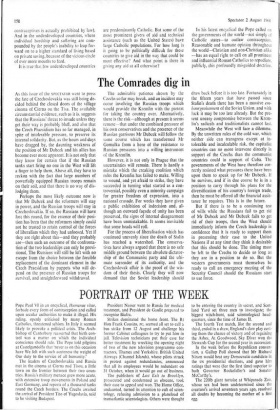A cloud over Christendom
Indeed, so outlandish did the Pope's long- awaited decision seem, so repugnant to reason and humanity alike, that the sPECTAIOR felt it right to invite a leading Member of the Catholic hierarchy in England, the Bishop of Leeds, to make out the case for the encyclical in our columns. His article appears on page 156. Readers can judge it 'for themselves. It does not, we would con- 'fess, convince us.
Theologically, the traditional derivation of the Roman Catholic church's teaching on Contraception from the remarkably obscure Genesis story of Onan has always seemed tar-fetched. And that teaching itself became still more implausible to all but the most jesuitically minded when Pope Pius XII first alloWed Catholic couples deliberately to 'make use of the so-called safe period and to atteriipt to avoid conception by means.of `rhythm' method. In his new encyclical Humanise vitae POpe Paul does:not merely reaffirm the implausibilities of his predeces- sors, but introduces new ones of his own. In particular, the argument that 'artificial' birth control opens up 'a wide and easy road . . . towards conjugal infidelity'—as if Catholics who are perfectly prepared to com- mit adultery might pause at the thought of offending their church by taking the pill— shows an almost embarrassing lack of worldly understanding.
Of course, the perversity of Humanae vitae will hardly have come as a surprise to anyone who has studied Pope Paul's previous encyclical. Populorum progressio, in which the world was urged to solve the problems of the underdeveloped countries by what amounted to a belated rehash of a few par- tially understood and long since discredited marxist suggestions for the spreading of material prosperity (and not, as we now learn, by the use, inter alia, of contracep- tion). Together they surely indicate that, if Catholicism is to survive (and the full extent of the cracks and rumbles within the church caused by the latest encyclical has yet to be seen), then. it will, in effect, have to be Catholicism without the Pope. contraceptives is actually prohibited by law). And in the underdeveloped countries, where individual hardship and suffering are com- pounded by the people's inability to leap for- ward on to a higher standard of living based on private saving, because of the vicious circle of ever more mouths to feed.
It is true that few underdeveloped countries are predominantly Catholic. But some of the most prominent givers of aid and technical assistance (such as the United States) have large Catholic populations. For how long is it going to be politically difficult for these countries to give aid in the way that could be most effective? And what point is there in giving any aid at all otherwise? In his latest encyclical the Pope called en the governments of the world—not simply of Catholic states—to outlaw contraception. Reasonable and humane opinion throughout the world—Christian and non-Christian alike —has an equal right to call on all prominent and influential Roman Catholics to repudiate, publicly, this profoundly misguided doctrine.







































